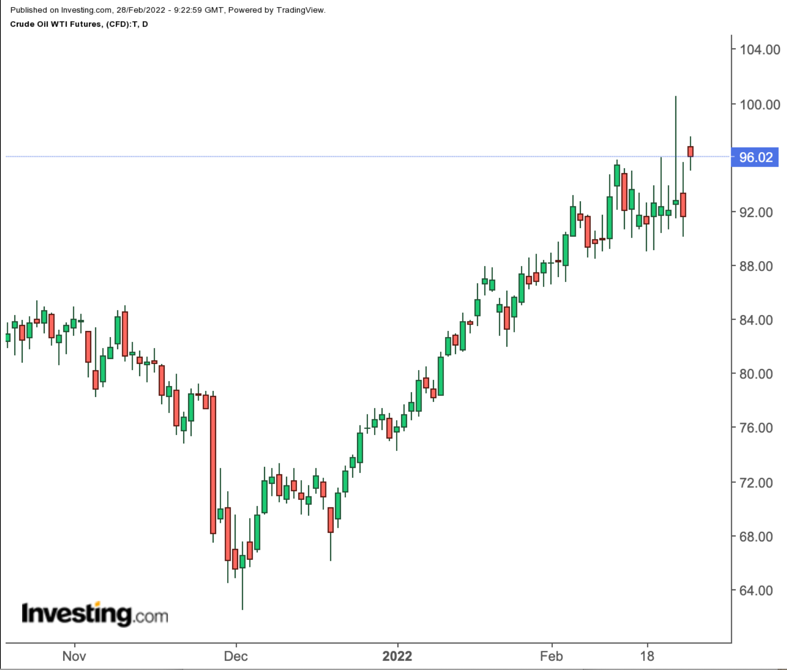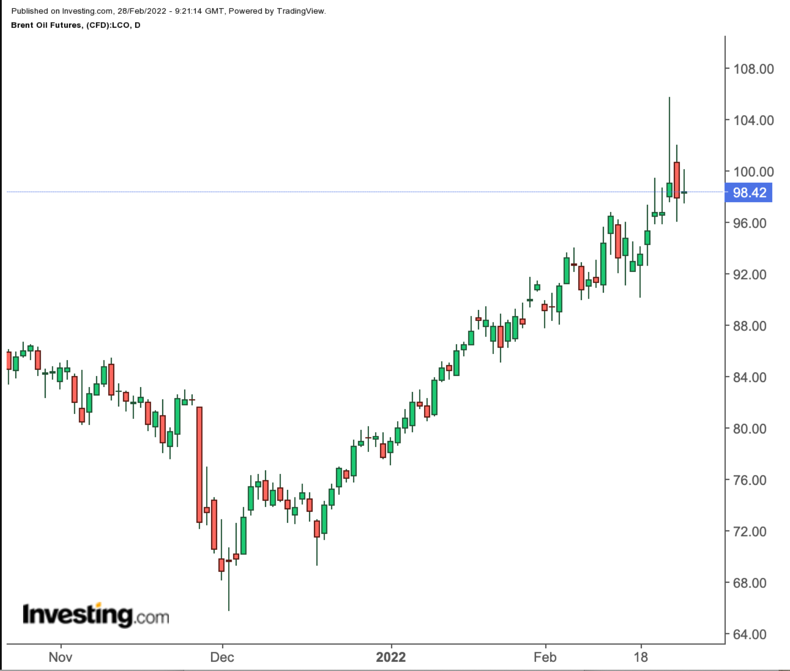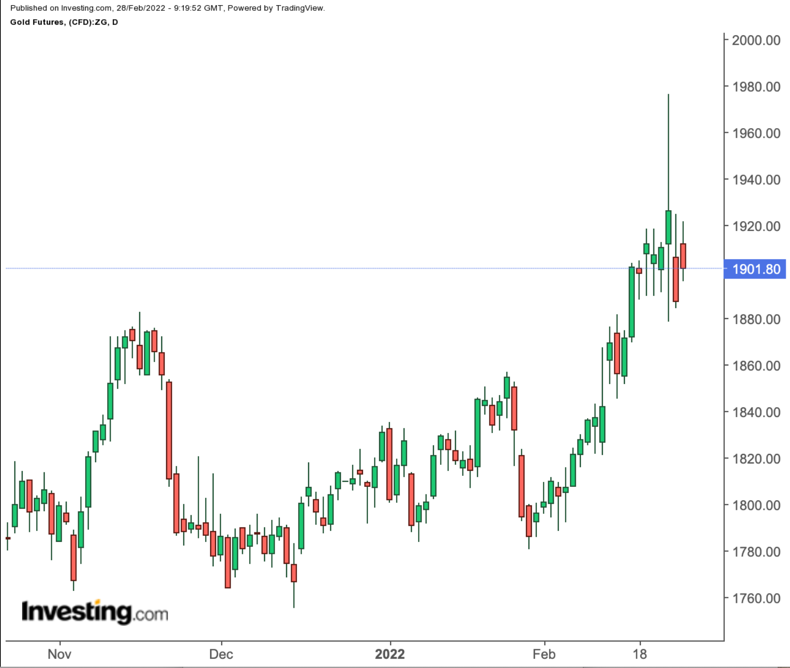Gold prices rise on weaker dollar, Fed easing bets; holds long-term appeal
The more fear among traders, the wilder markets go.
Most key commodities led by oil and gold opened higher on Monday, or up more than the previous session’s peak, after President Vladimir Putin placed Russia’s nuclear deterrent on high alert as Moscow was hit by the atomic equivalent of sanctions by the West for its invasion of Ukraine. 
London-traded Brent crude jumped 6% as it opened for the week in Asia with Goldman Sachs predicting as much as $120 for a barrel of crude in short order. 
Gold futures surged at the open, jumping to almost $1,920, looking set to breach last week’s highs of above $1,976, before settling lower, at $1,903, still higher than last Friday's close.

Gaps up—or down—typically happen when headlines cause market fundamentals to change rapidly while markets are closed. Putin placed Russia's "deterrence forces,” which wield nuclear weapons, onto high alert as the 27-nation European Union decided on Sunday, for the first time in its history, to supply weapons to a country at war—Ukraine.
SWIFT Strike On Russian Commodities
The rallies in oil and gold also came after various Russian banks were excluded from the SWIFT international payment system by Western nations determined to deliver the ultimate financial punishment to Moscow and in an attempt to end its raid of its neighbor that began late last week.
While the United States and the EU had taken pains not to target Moscow’s energy exports with sanctions, due to their own reliance on its oil and gas, the SWIFT-related sanctions would severely impair trade in Russian commodities because of the inability of the implicated banks to process overseas payments. Some 300 Russian financial institutions use SWIFT for interbank transfers.
Russian banks denied access to SWIFT will find it harder to communicate with peers internationally, even in friendly countries such as China, slowing trade and making transactions costlier, Reuters reported.
And just today the European Central Bank warned that Sberbank Europe, a unit of Sberbank, one of Russia's largest banks, and two other subsidiaries "are failing or likely to fail," as a result of the additional sanctions on Russia.
The White House and its Western peers have not yet announced which Russian banks would be targeted under the SWIFT exclusion. But if the list covers the largest Russian banks, such as VTB and Gazprombank, it would be "an absolutely huge deal," Edward Fishman, an expert on economic sanctions at the Eurasia Center of the Atlantic Council think tank, wrote on Twitter.
To make matters worse for the Kremlin, the Russian ruble was in free fall and there was little that the sanctioned central bank of Russia or the Putin administration could do to rescue the currency.
Price Forecasts Revved Up For Russian Commodities
With the looming uncertainties over the Russia-Ukraine crisis, analysts revised up price forecasts on a bunch of commodities, especially those that Russia produces in great quantities, fearing trade blockages in them.
Russia produces 10% of global oil and supplies 40% of Europe's gas. It is the world's largest grains and fertilizers exporter, top palladium and nickel producer, third-largest exporter of coal and steel, and fifth-largest wood exporter.
“We expect the price of consumed commodities that Russia is key producer of to rally from here,” Goldman Sachs said.
“This includes oil, European gas, aluminum, palladium, nickel, wheat and corn,” it said.
“For oil, this represents $110/bbl to $120/bbl short-term price upside should 2 to 4 mb/d (million barrels per day) of demand destruction be required to compensate for commensurate 1-month loss of Russian exports."
But the sanctions weren’t entirely bullish for commodities.
Russian Planes Blocked Too, Iran Nuclear Talks Head For Finish Line
Under a separate action, European nations and Canada also shut their airspace to Russian aircraft to pressure Putin to end his invasion. Aeroflot immediately canceled all flights to European destinations. The fallout comes as the airline industry continues to grapple with the fallout from the COVID-19 pandemic that is still undermining global demand for travel.
Amid the crisis with Ukraine, Russia’s top diplomat at the Iran nuclear talks, Mikhail Ulyanov, said there was a “very high probability” that the disagreement between the US and Iran on the 2015 atomic accord will be resolved before the end of next week.
Ulyanov said “surprise or negative developments” could still scuttle the negotiations but surmised that he was “almost for sure” that differences between Tehran and other delegations to the talks will be settled by mid-March, paving the way for the legitimate return of Iranian oil to the market.
That’s why even as Citibank revised up its Q1 2022 oil price forecasts by $12 to $91, it said it expected prices to fall to $60s levels by year-end.
“Expect a very well-supplied oil market to emerge by 2H’22, if not 2Q’22. this should blunt prices even with ongoing geopolitical risks,” added Citibank.
With sanctions against Russia escalating and market volatility remaining at elevated levels, testimony on the economy and monetary policy by US Federal Reserve Chair Jerome Powell this week will need to reassure investors that the Fed will take steps to tackle soaring inflation as the economic outlook grows more uncertain.
Fed Chair Testimony, US February Jobs Report
Powell is due to testify before the House Committee on Financial Services on Wednesday, and again before the Senate Banking Committee on Thursday.
The Fed has indicated that it is poised for an interest rate lift-off at its upcoming March meeting, to combat inflation which is running at a 40-year high. But now Fed officials must weigh the geopolitical and economic fallout from the conflict in Ukraine against mounting an aggressive attempt to curb inflation.
Russia’s invasion of Ukraine will fuel a sharper increase in the cost of living by driving up energy prices, while the extra squeeze on household spending is likely to act as a drag on the economic recovery, which has already been hit by the Omicron wave.
Economists expect Friday’s US jobs report for February to show that the economy added 450,000 jobs with the unemployment rate expected to tick down to 3.9% and average hourly earnings forecast to rise at a 5.8% annual rate.
Ahead of the employment report, payrolls processor ADP is due to release figures on private sector hiring on Wednesday and the Labor Department is to publish the weekly report on initial jobless claims on Thursday.
The economic calendar also features surveys of the manufacturing and service sectors for February by the Institute of Supply Management, which are likely to have rebounded as the impact of the Omicron wave on business activity subsided.
Disclaimer: Barani Krishnan uses a range of views outside his own to bring diversity to his analysis of any market. For neutrality, he sometimes presents contrarian views and market variables. He does not hold a position in the commodities and securities he writes about.
